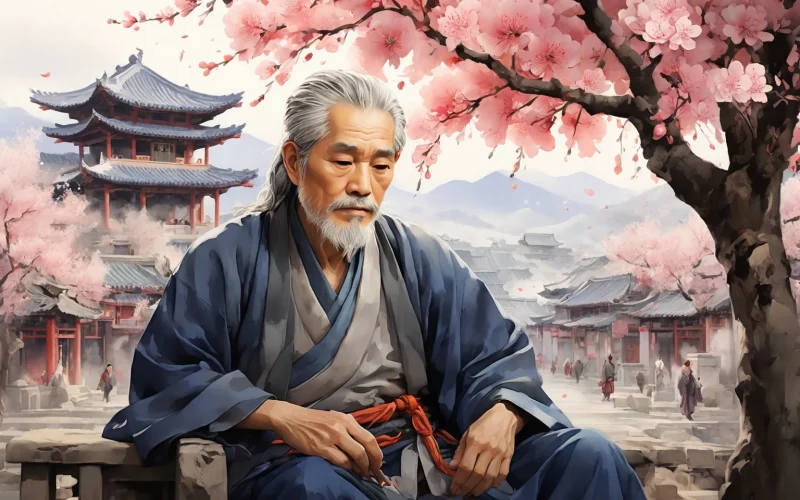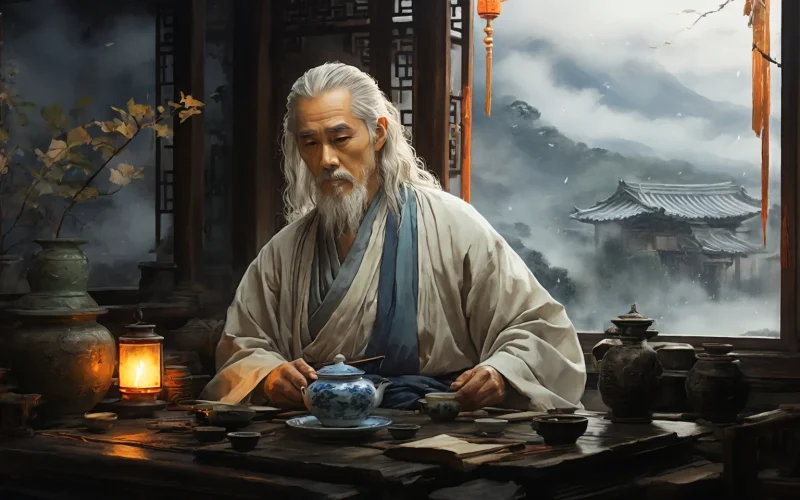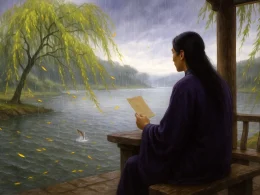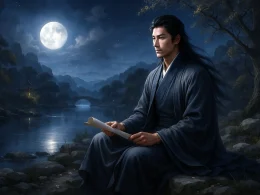The peach and plum flowers east of the capital
Fly up and down and here and there.
Where will they fall?The maiden in the capital loves rosy hue;
She would sigh for the flowers falling out of view.
Her rosy color fades when flowers fall this year.
When flowers blow again, will she pretty appear?
I've seen cypress cut down as fuel with pine trees;
I've heard the mulberry fields turn into the seas.
We see no ancients now east of capital town,
But we still see today the wind blow flowers down.
The flowers of this year look like those of last year;
But next year the same people will not reappear.
I'd like to tell the rosy faces in their prime
Not to forget the old before their dying time.
Pitiable is the old man whose hair turns white,
But in his prime he was rosy-cheeked, fair and bright.
Noble sons and daughters under the leafy trees
Sing and dance before the flowers blown down by the breeze.
By lakeside stand ministers' richly brocaded bowers;
Pictures of immortals hang in generals' towers.
When you're ill and cast down, with you none would abide.
Who would then make merry in spring days by your side?
How long can your finely arched eyebrows remain fair?
Your head will soon be covered with disheveled hair.
See where the noble sang and danced in merriment,
Now you can only hear at dusk the birds' lament.
Original Poem:
「代悲白头翁」
刘希夷
洛阳城东桃李花,飞来飞去落谁家?
洛阳女儿惜颜色,坐见落花长叹息。
今年花落颜色改,明年花开复谁在?
已见松柏摧为薪,更闻桑田变成海。
古人无复洛城东,今人还对落花风。
年年岁岁花相似,岁岁年年人不同。
寄言全盛红颜子,应怜半死白头翁。
此翁白头真可怜,伊昔红颜美少年。
公子王孙芳树下,清歌妙舞落花前。
光禄池台文锦绣,将军楼阁画神仙。
一朝卧病无相识,三春行乐在谁边?
宛转蛾眉能几时?须臾鹤发乱如丝。
但看古来歌舞地,惟有黄昏鸟雀悲。
Interpretation:
This is a poem that imitates ancient Yuefu (Music Bureau) style, based on the old themes of the Han dynasty's Yuefu Songs, but with innovative content. The poem depicts the life situations of a woman in Luoyang and an old man with white hair, expressing the poet’s sorrow and lamentation through reflections on the fleeting nature of youth and the impermanence of wealth and status. Liu Xiyi passed away at the age of 27, and his life was filled with repression. This poem largely reflects his deep awareness of life's impermanence and social injustice.
First Couplet: “洛阳城东桃李花,飞来飞去落谁家?”
In the eastern part of Luoyang, peach and plum blossoms bloom; they fly back and forth, but who do they fall to?
These lines begin by depicting the vivid scene of springtime in Luoyang, where the flowers bloom and fall, symbolizing the fleeting nature of life. The poet’s use of the "flying" blossoms introduces a sense of transience, questioning where the beauty of youth and prosperity will end up, underscoring life's impermanence.
Second Couplet: “洛阳女儿惜颜色,坐见落花长叹息。”
The women of Luoyang lament their fading beauty, sitting and watching the fallen flowers with long sighs.
This couplet brings in the sorrow of the women in Luoyang as they witness the inevitable decay of their beauty, akin to the flowers' fall. The connection between the falling petals and the passing of time conveys a deep sense of regret and helplessness, as both beauty and life are transient.
Third Couplet: “今年花落颜色改,明年花开复谁在?”
This year's flowers have fallen and changed color, who will remain when the flowers bloom again next year?
The poet here uses the cycle of flowers as a metaphor for the fleeting nature of life and the passage of time. The flowers' change in color and their eventual return only highlight the idea that the present moment, like the flowers, will eventually pass, and the people who experience it may no longer be there.
Fourth Couplet: “已见松柏摧为薪,更闻桑田变成海。”
Already have I seen pines and cypresses chopped for firewood, and heard of mulberry fields turning into the sea.
This couplet uses metaphors to emphasize the drastic changes in the world. The destruction of the pines and cypresses and the transformation of mulberry fields into the sea symbolize the impermanence of all things, reinforcing the theme of change and the inevitability of time.
Fifth Couplet: “古人无复洛城东,今人还对落花风。”
The ancient ones no longer appear in the eastern part of Luoyang, yet today, people still face the wind with falling flowers.
This couplet reflects the eternal passage of time. The "ancient ones" are gone, but the same natural scenes of falling flowers remain. This stark contrast serves to emphasize the relentless forward march of time and the fleeting nature of human existence.
Sixth Couplet: “年年岁岁花相似,岁岁年年人不同。”
Year after year, the flowers remain the same, yet every year, the people change.
Here, the poet compares the constancy of nature with the inevitable changes in human life. The flowers may bloom in the same pattern, but the people who witness them are constantly changing, reflecting the transient nature of human life.
Seventh Couplet: “寄言全盛红颜子,应怜半死白头翁。”
I urge the youth in their prime to pity the old white-haired man, whose glory has faded.
This couplet contrasts the beauty of youth with the inevitability of aging. The poet calls on the young to be compassionate toward the elderly, emphasizing the fleeting nature of youth and the inevitable approach of old age.
Eighth Couplet: “此翁白头真可怜,伊昔红颜美少年。”
This old man with white hair is truly pitiful, for he was once a beautiful young man.
The poet reflects on the contrast between the elderly man's past and present, highlighting the cruelty of time that turns youth into old age. This serves as a poignant reminder of life's transient nature.
Ninth Couplet: “公子王孙芳树下,清歌妙舞落花前。”
The young lords and sons of nobility once gathered beneath fragrant trees, listening to sweet songs and watching beautiful dances before the falling flowers.
This couplet evokes the opulence and youthful enjoyment of the aristocracy, contrasting their joyful lives with the fleeting beauty of the flowers. The imagery of songs and dances evokes an era of luxury that is now gone, just like the flowers.
Tenth Couplet: “光禄池台文锦绣,将军楼阁画神仙。”
The grandeur of the imperial gardens and the elegant towers of generals resemble paintings of immortals.
Here, the poet reflects on the luxurious, almost otherworldly, grandeur of the past, symbolized by the beauty of the gardens and towers. These images reinforce the contrast between past riches and the inevitable decay that follows.
Eleventh Couplet: “一朝卧病无相识,三春行乐在谁边?”
One day, when I fall ill, no one will recognize me, and who will I share the joys of spring with then?
This couplet addresses the sudden shift in fortune that comes with illness, contrasting the pleasures of youth and vitality with the loneliness that can come with old age or sickness.
Twelfth Couplet: “宛转蛾眉能几时?须臾鹤发乱如丝。”
How long can the delicate moth-like brows last? In the blink of an eye, they turn into white hair, tangled like threads.
The poet expresses the suddenness of aging, using the image of the delicate moth-like brows to emphasize the beauty of youth, and contrasting it with the swift arrival of old age. This highlights the fleeting nature of life and beauty.
Thirteenth Couplet: “但看古来歌舞地,惟有黄昏鸟雀悲。”
Look at the places once filled with songs and dances, now only the birds of dusk sing mournfully.
The poet contrasts the once vibrant, song-filled places with the present loneliness and sorrow. The mournful cries of the birds at dusk serve as a symbol of the passage of time and the sorrow that accompanies it.
Writing Features:
- Metaphors and Emotional Expression: The poem uses the metaphor of falling flowers to express the transient nature of life, with a philosophical tone that blends beauty and sorrow.
- Clever Contrasts: The contrast between youth and old age, prosperity and decline, and ancient and modern times creates a vivid image of life’s impermanence.
- Rich Use of Allusions: By referencing historical changes like the transformation of mulberry fields into seas, the poet deepens the theme of life’s transience.
- Beautiful Language: The poem’s formal structure and harmonious sounds, especially in lines like "年年岁岁", have become legendary, with a timeless poetic rhythm.
Overall Appreciation:
This poem draws upon the metaphor of falling flowers to express the poet's lament over the fleeting nature of life. It contrasts the vibrant, prosperous past with the inevitable decline of time, using nature as a lens through which to view human life. The poet blends ancient Chinese poetic traditions with a deep, personal reflection on the passage of time, crafting a poem that remains resonant across generations.
Insights:
Through this poem, the poet reflects on the inevitability of aging and the passage of time, urging readers to cherish the present. The contrast between youthful beauty and old age serves as a reminder of life's fleeting nature and the importance of finding meaning in the here and now. The poem encourages us to live with awareness of our own mortality, to embrace each moment, and to accept the inevitable changes that time brings.
Poem translator:
Xu Yuan-chong (许渊冲)
About the poet:
Liu Xiyi (刘希夷), circa 651–680 AD, was a poet of the Tang Dynasty from Ruzhou City, Henan Province. Skilled in playing the pipa, he excelled in composing narrative poems, often focusing on themes of boudoir sentiments. His poetry is characterized by its delicate, ornate language and a predominantly melancholic tone.











